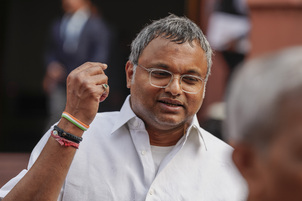New Delhi: In a significant verdict, the Supreme Court on Thursday ruled that timelines cannot be fixed for the governor and the President for giving assent to bills passed by state assemblies, and the judiciary cannot also grant deemed assent to them.
A five-judge Constitution bench headed by Chief Justice BR Gavai unanimously held that it would be against the interest of federalism if the Governor, without following due process under Article 200 (power of the Governor to provide assent to bills passed by the assembly), is allowed to withhold bills.
The bench also comprising Justices Surya Kant, Vikram Nath, P S Narasimha, and A S Chandurkar said, “We don’t think governors have unfettered power to sit over bills passed by state assemblies”.
The court said that the Governor has three Constitutional options when dealing with a Bill: to grant assent, to reserve it for the consideration of the President, or to withhold assent and return the Bill to the Legislative Assembly for reconsideration. Further, the court said that the discharge of these functions is generally not justiciable, meaning the court cannot examine the merits of the decision.
However, where there is a prolonged, unexplained, or indefinite delay, Constitutional courts may issue limited directions, and the same principle applies to the President. While there is an absolute bar on judicial review of the merits of these Constitutional functions, courts may intervene in cases of unreasonable inaction by Constitutional authorities, the top court said.
A five-judge Constitution Bench, headed by Chief Justice BR Gavai and including Justices Surya Kant, Vikram Nath, PS Narasimha, and AS Chandurkar, had held hearings on the matter for 10 days in August and September, addressing a Presidential Reference challenging the Supreme Court’s authority to set timelines under Articles 200 and 201 for Governors and the President to act on state Bills.
The reference stems from an April 8 judgement by a two-judge SC bench on a petition by the Tamil Nadu government, which challenged Governor RN Ravi’s delay in clearing 10 re-passed Bills and his subsequent decision to reserve them for the President’s consideration.
The April ruling regulated the assent process and fixed deadlines while also invoking Article 142 to grant “deemed assent” to delayed bills. The Bench had prescribed one month for Governors and three months for the President to decide on Bills.
The Tamil Nadu Bills
In May 2025, President Droupadi Murmu had sent a presidential reference to the top court referring 14 constitutional questions to the Supreme Court of India under Article 143 (Power of President to consult Supreme Court), asking the top court to provide its opinion on a range of issues including whether courts can impose timelines on Governors and the President to act on bills passed by state legislatures. Further, the President had also asked the apex court’s opinion on constitutional options available to a Governor when a Bill is presented to them under Article 200 of the Constitution of India.
Her reference came after the Supreme Court held Tamil Nadu Governor RN Ravi’s withholding of 10 Bills as “illegal and arbitrary”, and directed that assent decisions must be taken within three months.
In April 2025, a two-judge Bench of the Supreme Court, using its inherent powers under Article 142 of the Constitution, resolved a standoff between the Tamil Nadu government and Governor RN Ravi over the delay in granting assent to Bills passed by the Assembly. It ruled that Governor Ravi’s refusal to approve 10 Bills in Tamil Nadu was both “illegal and arbitrary” and set a three-month deadline for Presidential and gubernatorial approval of Bills passed by the legislature for a second time.
“The President is required to take a decision on the Bills reserved for his consideration by the Governor within a period of three months from the date on which such reference is received,” said a Bench of Justices JB Pardiwala and R Mahadevan. If there is no decision within this time frame, states are entitled to file writ petitions seeking a writ of mandamus against the President, the Justice Pardiwala-led Bench clarified.
The apex court used the powers for the purpose of declaring the 10 withheld Bills as deemed to have been assented to on the date when they were presented to the Governor after being reconsidered by the state legislature. The top court held that once a Bill is returned, re-passed by the legislature, and presented again to the Governor, it is not open for the Governor to reserve it for the President’s consideration. Additionally, the President is now under an obligation to provide reasons for their decision, which must be communicated to the state government.
Further, it suggested that the President should consult the Supreme Court on Bills involving Constitutional issues. The judgment, apparently, brought Presidential actions under judicial review by favouring a three-month deadline for granting assent to Bills. The issue took a new twist after Vice President Jagdeep Dhankhar used strong words against the judiciary, comparing Article 142 to a ‘nuclear missile’ available to the judiciary against democratic forces.






